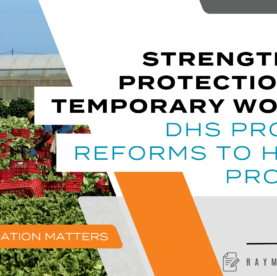Biden Administration Proposes Increasing Cost of Nonimmigrant Visas
The Biden Administration recently proposed a price increase for nearly all nonimmigrant visas. Government officials say the increase is necessary to fund immigration services, which are already stretched to their limit, but critics suggest it could be a financial barrier to noncitizens seeking to enter this country.
Proposed Rule in the Federal Register
According to the proposed rule by the Department of State (“DOS”), the U.S. government intends to adjust the Schedule of Fees for Consular Services of the Bureau of Consular Affairs for several nonimmigrant application fees.
The proposal increases nonimmigrant visa application fees from $160 to $245, an increase of 53%. The fee for H, L, O, P, Q, and R visa applications would increase from $190 to $310 under the proposal, an increase of 63%. Border crossing cards, which are identity documents for Mexican nationals entering border regions of the United States, would see a 53% increase as well, from $160 to $245.
The Department of State, which announced the proposal in late December, is accepting public comment until Feb. 28, 2022. If the proposal becomes a final rule, the changes will likely go into effect in September of 2022.
USCIS: Funds Are “Critical” to Agency Success
Concerns over the funding of the American immigration system are certainly not new. In fact, U.S. Citizenship and Immigration Services (“USCIS”), an agency of the Department of Homeland Security (“DHS”) that oversees the country’s naturalization and immigration system, recently expressed serious concerns over its lack of funding. USCIS Director Ur Jaddou recently acknowledged the agency’s funding issues, noting it was critical for the agency to have “additional resources to decrease processing times and to tackle the unprecedented backlog and our ever-growing humanitarian mission.”
The proposed fee increases highlight the ongoing tug-of-war between USCIS and Congress on the issue of funding. The agency received nearly $128 million in 2020 from Congressional appropriations, and lawmakers have proposed appropriating as much as $474 million for the agency in the fiscal year 2022. Despite this funding, the agency continues to operate at a loss, according to Director Jaddou, who noted that the fee increases “will be critical, critical to the success of our mission, and even more critical if USCIS continues as a primarily fee-funded [organization] without appropriate congressional funding.”
As recently as 2020, USCIS requested a $1.2 billion bailout from Congress and narrowly averted massive furloughs within the agency.
Concerns Over Fee Increase
The Biden administration has made significant efforts to reverse Trump-era restrictions on immigration and incentivize immigration into the United States. Some critics of the proposal note that it comes at a time when the U.S. is struggling to encourage immigration into the United States. David Bier, an immigration policy expert at the CATO Institute, recently noted that “[a]ll of the fee increases are happening at a time when tourism and travel to the United States is already at an all-time low, and the State Department is imposing waits of six months to a year in many places for a tourist- or business-travel visa.”
To learn more about this blog post, or if you have any other immigration concerns, please feel free to contact me at rglahoud@norris-law.com or (484) 544-0022.




